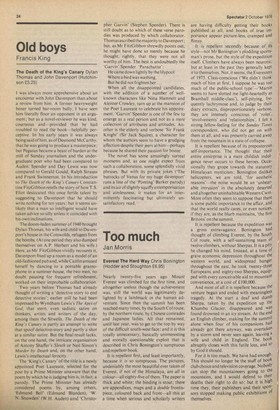Old boys
Francis King
The Death of the King's Canary Dylan Thomas and John Davenport (Hutchinson £3.25)
I was always more apprehensive about an encounter with John Davenport than about a review from him. A former heavyweight boxer turned bar-room bully. I have seen him literally floor an opponent in an argument: but as a novel-reviewer he was kind. courteous and--provided that he had troubled to read the book—helpfully perceptive. In his early years it was always being said of him, as of Desmond McCarthy, that he was going to produce a masterpiece; but Pegasus became a beast of burden at the mill of Sunday journalism and the undergraduate poet who had been compared to Auden. Spender and Day Lewis was now compared to Gerald Gould, Ralph Strauss and Frank Swinnerton. In his introduction to The Death of the King's Canary Constantine FitzGibbon retells the story of how T.S. Eliot desiccated this once fertile talent by suggesting to Davenport that he should write nothing for ten years; but it seems unlikely that a man so intelligent would have taken advice so silly unless it coincided with his own inclinations.
The doom-laden summer of 1940 brought Dylan Thomas. his wife and child to Davenport's house in the Cotswolds, refugees from the bombs. (At one period they also dumped themselves on A.P. Herbert and his wife.) Here, as Mr FitzGibbon vividly recounts it, Davenport fixed up a room as a model of an old-fashioned puband, while Caitlin amused herself by dancing to a portable gramophone in a summer-house, the two men, no doubt pausing for frequent refreshment, worked on their improbable collaboration.
Two years before Thomas had already thought of writing a 'detective story to end detective stories"; earlier still he had been impressed by Wyndham Lewis's The Apes of God, that stern, even sadistic satire on thinkers, artists and writers of the day, among them the Sitwells. The Death of the King's Canary is partly an attempt to write that spoof detective-story and partly a shot at a similar satire. But the final result lacks. on the one hand, the intricate organisation of Antony Shaffer's Sleuth or Neil Simon's Murder by Death and, on the other hand, Lewis's intellectual ferocity.
The 'King's Canary' of the title is a newly appointed Poet Laureate, selected for the post by a Prime Minister unaware that the poem by which he is judging him is, in fact, a parody. The Prime Minister has already considered poems by, among others, 'Edmund Bell' (Edmund Blunden), 'W. N. Snowden' (W.H. Auden) amd 'Christo
pher Garvin' (Stephen Spender). There is still doubt as to which of these verse parodies was produced by which collaborator. Thomas ascri bed the majority to Davenport: but, as Mr FitzGibbon shrewdly points out, he might have done so merely because he thought, rightly, that they were not all worthy of him. The best is undoubtedly the *Garvin'Spender 'Parachutist': He came down lightly by the I ilypool Where a bird was washing.
But he did not frighten her...
When all the disappointed candidates, with the addition of a number of wellknown characters like Nina Hamnett and Aleister Crowley, turn up at the mansion of the Poet Laureate to celebrate his appointment, 'Garvin' 'Spender is one of the few to emerge as a real person and not as a mere collection of attributes and attitudes. Another is the elderly and verbose 'Sir Frank Knight' (Sir Jack Squire), a character for whom the authors seem to have a grudging affection despite their jeers at him--perhaps because he shared their passion for booze.
The novel has some amusingly surreal moments and, as one might expect from such a collaboration, some splendidly vivid phrases. But with its private jokes ('The buttocks of Venus for my huge davenport' runs a line of the 'Ponting' Barker parody) and its a ir of sl ightly squiffy extemporisation and aimlessness, it makes for an intermittently fascinating but ultimately unsatisfactory read.


































 Previous page
Previous page